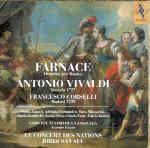You may have noticed that two composers are named for this opera. As we know, opera librettos frequently were set to music by more than one composer in the 18th (and even 19th) century. Francesco Corselli was French by birth (Francois Courcelle was his real name) but worked in Parma and Madrid. His Farnace was written in 1736. Vivaldi composed his Farnace in 1727. For his performances of Vivaldi’s version (in Madrid in October, 2001), the great string player and conductor Jordi Savall decided to do what was common practice back in Vivaldi’s time–add some arias and other music from a contemporary work on the same subject–and for this he chose selections from Corselli’s score. For the record, the bits of Corselli that Savall includes are a Sinfonia plus a recitative and aria for Berenice used as a prologue to Act 1, an aria for Farnace to begin Act 2, and a march preceding the action in Act 3–altogether a bit more than 20 minutes. There is no “Corselli” mixed in with “Vivaldi”. To these ears, all is well; precisely why it was necessary to add 20 minutes to more than two and a half hours of music remains mysterious, but the Corselli–a composer unrepresented on disc–is fine music. [Ed. note: A couple of Corselli’s (excellent) sacred vocal compositions appear on a Dorian recording–type Q3734 in Search Reviews–under his “other” name, Courcelle.]
The plot: Farnace, King of Pontus, has been defeated, and to avoid their falling into the hands of the enemy, he commands his wife, Tamiri, to kill their son and then herself. Tamiri’s mother, Berenice, hates Farnace and is in cahoots with Pompey, the Roman victor, to kill him. Selinda, Farnace’s sister, is taken captive by the Roman Aquilius, who falls in love with her, as does Berenice’s Captain, Gilades. Selinda plays them off one another in an attempt to save her brother. Somehow, it ends happily and everyone is spared. (Welcome to the world of 18th-century opera!)
The playing by Savall’s musicians is amazingly beautiful throughout–warm, expressive, and as songful as the singing–and the engineers have captured a lovely ambience from Madrid’s Teatro de la Zarzuela that only occasionally sounds a bit cavernous. The singing also is uniformly fine, but this set underlines an issue about recorded Baroque opera: If we can’t see the performers, the gender-bending can get confusing. For instance, the Gilade of soprano Cinzia Forte is simply too light for the role (it was composed for a castrato, which, while possibly socially confusing, was no problem on stage). And conversely, the noble role of Farnace was composed for female contralto, and while it makes dramatic sense to have it sung by a baritone as it is here (and quite beautifully and movingly by Furio Zanasi), it alters the whole opera’s texture and plays down how sympathetic we should feel toward the character. (A four-square recording of the work on Nuova Era in which Farnace is sung by a woman makes the point clear.)
All that aside, here we have (in addition to the aforementioned Forte and Zanasi) a stunning, sincere Tamiri in the person of the fine artist Sara Mingardo; contralto Sonia Prina’s wonderfully dusky Pompeo (this role also was probably cast for castrato, and Prina sounds manly); and baritone Fulvio Bettini’s weighty addition to the short role of Aquilius. Gloria Banditelli’s mezzo is well-used as Selinda, but again, in her exchanges with Forte’s Gilade, they sound like they should be one-another. Adriana Fernandez’s Berenice should be more fiercely drawn. In all–and please note that most of my objections are academic–this is a superb achievement.
































